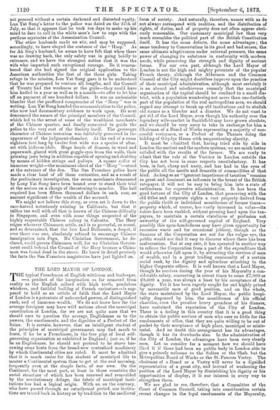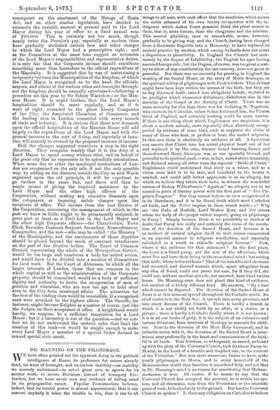THE LORD MAYOR OF LONDON.
THE typical Frenchman of English witticism and burlesque, —a product of the imagination as far removed from reality as the English milord with high teeth, pendulous whiskers, and faithful bulldog of French caricature—is sup- posed to hold as an article of faith that the Lord Mayor of London is a potentate of unbounded powers, of distinguished rank, and of immense wealth. We do not know how far the average foreigner may have wild notions about the municipal constitution of London, for we are not quite sure that we should care to question the average_ Englishman as to the powers, the emoluments, and the dignities of a Prefect of the Seine. It is certain, however, that an intelligent student of the principles of municipal government may find much to learn, if he be a Frenchman, in the free play of local self- governing organisation as exhibited in England ; just as, if he be an Englishman. he should not pretend to be above bor- rowing some hints from the brand-new centralised machinery by which Continental cities are ruled. It must be admitted that it is much easier for the student of municipal life to master a Continental system than to get at the real meaning, frequently even at the simple facts, of our own. On the Continent, for the most part, at least in those countries the social structure of which has been renewed and remoulded by the revolutionary deluge, the fabric of municipal insti- tutions has had a logical origin. With us, on the contrary, who have passed through no cataclysmal period, our institu- tions are traced back in history or by tradition to the mediaeval
form of society. And naturally, therefore, names with as do not always correspond with realities, and the distribution of rights, of duties, and of property does not often appear obvi- ously reasonable. Our customary municipal law thus very much resembles the political part of the British Constitution itself. It has the same defects, the same advantages ; the same tendency to Conservatism in its good and bad senses, the same ultimate adaptiveness under external pressure, the same power of changing its substance in conformity with modern needs, while preserving the strength and dignity of ancient forms. For our own part, although the Lord Mayor of London is not the high and mighty potentate of the popular French theory, although the Aldermen and the Common Council of the City might doubtless improve upon the practice of their municipal administration, although most certainly it is an absurd and mischievous anomaly that the municipal organisation of the capital should be confined to a small dis- trict, with a population numbering not more than one-fortieth part of the population of the real metropolitan area, we should regard any attempt to break up old institutions and to abolish old names as a blunder and a disaster. We do not want to get rid of the Lord Mayor, even though his authority over the legendary wife-market in Smithfield may have grown obsolete, and we should be very sorry to take in exchange for him a Chairman of a Board of Works representing a majority of suc- cessful vestrymen, or a Prefect of the Thames doing the bidding of Gwydyr House with unquestioning alacrity.
It must be admitted that, having tried side by side in London the ancient and the modern systems, we are much better satisfied with the results of the former. We are ready to admit that the rule of the Vestries in London outside the City has not been in some respects unsatisfactory. It has been, in fact, cheap and nasty, and has had in the eyes of the public all the merits and demerits of commodities of that kind. As long as an " ignorant impatience of taxation" remains so great and dominant an influence in the breast of the British ratepayer, it will not be easy to bring him into a state of enthusiasm for expensive administration. It has been the good fortune of the City of London, that preserving with the old titles and corporate rights a vast property derived from the public thrift or individual munificence of former times— property which, of course, has vastly increased in value—its rulers have been enabled, without pressing hard upon the tax- payers, to maintain a certain stateliness of profusion not unworthy of the self-governed capital of England. Very possibly this open-handedness may have given opportunity for excessive waste and for occasional jobbery, though as the finances of the Corporation are not for the vulgar eye, the public would not find it easy to discover where there has been malversation. But at any rate, it has operated in another way to relieve the Corporation from a part of the expenditure that would otherwise fall upon it, by attracting the services of men of wealth, and in a great trading community of a certain social rank, by the dignity and splendour attaching to the higher Corporate offices. It is well known that a Lord Mayor, though he receives during the year of his Mayoralty a con- siderable salary, amounting in recent times to some £7,000 or £8,000 a year, was always a loser by his acceptance of the dignity. Yet it has been eagerly sought for and highly prized by mercantile men of good position, and on the whole, the state maintained by the Lord Mayor, the public hospi- tality dispensed by him, the munificence of his official charities, even the peculiar heavy grandeur of his dinners, have sustained the reputation of the City of London. There is a feeling in this country that it is a good thing to obtain the public services of men who care so little for the emoluments of office, that they are quite willing to be out of pocket by their acceptance of high place, municipal or minis- terial. And no doubt this arrangement has its advantages, though it has its drawbacks also. In the administration of the City of London, the advantages have been very clearly seen. Let us consider for a moment how we should have liked it if there had been no public body in London able to give a princely welcome to the Sultan or the Shah but the Metropolitan Board of Works or the St. Pancras Vestry. The chairman of a Board or a Vestry will never be a dignified representative of a great city, and instead of weakening the position of the Lord Mayor by diminishing his dignity or his opportunities of display, it is our interest in every way to strengthen them.
We are glad to see, therefore, that a Committee of the Court of Common Council, taking into consideration certain recent changes in the legal emoluments of the Mayoralty, consequent on the enactment of the Metage of Grain Act, and on other similar legislation, have decided to commute the variable amount at present paid to the Lord Mayor during his year of office to a fixed annual sum of £10,000. This is certainly not too much, though nearly twice the Premier's pay, especially as modern ideas have gradually abolished certain fees and other charges to which the Lord Mayor had a prescriptive right ; and as the Committee at the same time suggest an extension of the Lord Mayor's responsibilities and representative duties, it is only fair that the Corporate income should contribute something more than heretofore to the official expenditure of the Mayoralty. It is suggested that by way of maintaining a reciprocity between the Municipalities of the kingdom, of which the Lord Mayor is recognised to be the head, the officials, mayors, and others of the various cities and boroughs through- out the kingdom should be annually entertained—following a precedent set this year by Sir Sidney Waterlow—at the Man- sion House. It is urged further, that the Lord Mayor's hospitalities should be more regularly, and as if it were of right, extended to the great Livery Companies of the City, the Associated Chambers of Commerce. and the leading men in London connected with every branch of trade and industry. It is obvious that these new demands upon the official hospitalities of the Mansion House will add largely to the expenditure of the Lord Mayor, and with the general increase in the cost of living, and especially of luxu- ries, will scarcely be covered by the proposed increase of income.
Still the changes suggested constitute a step in the right direction. They recognise frankly that it is the duty of a Lord Mayor to spend money without stint, and on behalf of the great city that he represents to be splendidly ostentatious. When some day or other the municipal institutions of Lon- don are reorganised on the only safe, if not the only possible way, by adding on the districts outside the City as new Wards organised upon the old principle, it will be expedient to go further in the same line, and there will then be ample means of giving the required assistance to the Lord Mayor and the other high officers of the Corporation, without making any excessive demands upon the ratepayers, or imposing unfair charges upon the recipients of office. The income from the vast Estates of the Corporation, concerning the management of which in the past we know so little, ought to be permanently assigned, in great part at least, as a Civil List to the Lord Mayor and the other high Corporate officers—the Chamberlain, Town Clerk, Recorder, Common Serjeant, Secondary, Remembrancer, Comptroller, and the rest—who may be called " the Ministry " of the Municipality, and the emoluments of those dignities should be placed beyond the reach of constant interference on the part of the elective bodies. The Court of Common Council, representing the whole of the Metropolitan district, would be too large and cumbrous a body for united action, and would have to be divided into a number of Committees for local work. But the Court of Aldermen, to which all the larger interests of London, those that are common to the whole capital as well as the administration of the Corporate property, should be committed, would be a body of sufficient dignity and authority to invite the co-operation of men of position and education, who are now too apt to hold aloof even in the City from municipal affairs. The attraction for the best of the trading class would be irresistible, if a recognised rank were attached to the highest offices. The Sheriffs, for instance, might become Knights as a matter of course, just like the Judges, on their acceptance of office. A knighthood would hardly, we suppose, be a sufficient temptation for a Lord Mayor; but if a baronetcy is out of the question—and we con- fess we do not understand the esoteric rules that limit the creation of this rank—it would be simple enough to make every Lord Mayor a member of a special Order devised to reward special civic merit.































 Previous page
Previous page